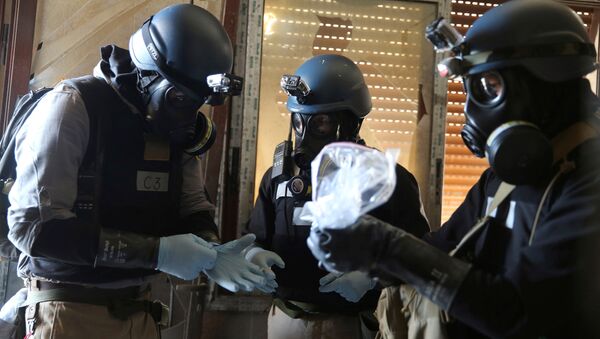Brian Becker, the host of Loud & Clear on Radio Sputnik, was joined by Mark Sleboda, a Moscow-based political analyst. Becker started by asking about the meaning of the Syrian claims to the ongoing armed conflict in the war-torn nation.
The claims are "all at this point, according to the Syrian deputy foreign minister, coming officially out of the Syrian government," said Sleboda. "To me what's most striking about this news is that you won't find any of it reported in the Western media whatsoever. The only way you'll find it is in the Russian media or sources drawing links from the Syrian government media. There is an automatic assumption in the Western media that we just ignore anything and everything that the Syrian government says. Now, we certainly shouldn't take everything they say at face value, any more than we should what the US government, the Russian government, any government says, but to completely reject and not report on what the Syrian government is … a complete failure of journalism."
Sleboda goes on to say that the chemical weapons discovered were "common respiratory agents used in riot control, but they are prohibited by the Chemical Weapons Convention (CWC) for use in warfare … the Russian permanent representative to the UN Vasily Nebenzia has pointed out that this is a violation of the CWC and would be a violation of such by the US if evidence determines that they have supplied that these weapons to their proxies [in Syria.]"
Becker then proceeded to note that it didn't make sense to him for the Syrian government to manufacture and use chemical weapons against their enemies as the war is going their way by most metrics.
"Chemical weapons are an extremely ineffective battlefield weapon," Sleboda replied. "[I]t depends on the use of particular agents but we're talking nerve agents like sarin, they can't be stored, they have to be delivered to an area. The most possible use for something like that is to clear an area of enemy troops immediately. Within a few hours of a large movement of your own forces into an area, there's problems with delivery, there's problems with blowback onto your own forces depending on the environmental conditions and the agent used."
"If there's one thing that the Syrian conflict has proven beyond a doubt, which I think everyone knowledgeable already knew, [is] that chemical weapons are terribly ineffective weapons as a battlefield [weapon] or as deterrence for anything. The one thing they seem to be good for is providing a pretext for operations within the country that has them. This is why I believe that the Syrian government, under prompting from Russia, was so willing to do away with its chemical weapons because they realized that they were far more a liability than … any type of military or strategic asset."
For that reason, Sleboda found "the accusations of large scale chemical weapon used by the Syrian government unconvincing, simply for that it makes no rational sense. Of course one of the arguments is the West are gearing for regime change in Syria always present is that they are not rational I don't accept that argument either."
Becker asked what the American endgame in Syria is, and whether or not the US intended to establish a permanent military presence there.
Sleboda wasn't positive. "There are 10 US military bases in northeast Syria in Kurdish-controlled territory. The US has no legal mandate to be in Syria doing anything, and they do not have the cooperation of the Syrian government. They are in violation of the UN charter by being there, they don't have any long-term mission in Syria. It is problematic for them that their only chosen standing proxies are the Kurds, because certainly Iraq, Turkey, and all the other regional forces do not want to see a Kurdish micro-state carved out of Syria."
"At this point I would presume that a large part of is being done simply for leverage in the final political settlement in Syria, and to declare that some type of victory was achieved at least over [Daesh] and paper over the rest of what has happened," Sleboda concluded.




